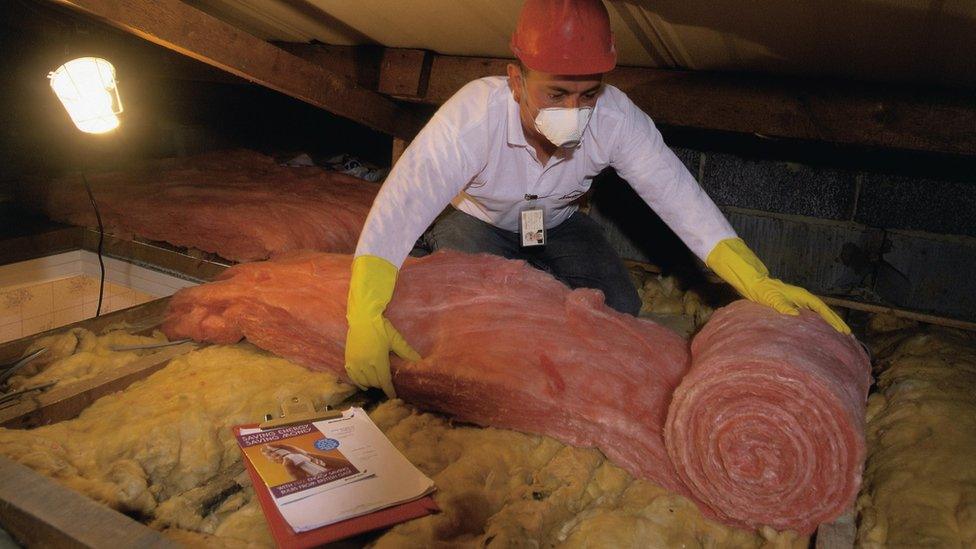Households 'need help to get warmer home'
- Published
- comments

England’s householders get a raw deal over insulating their homes to save on energy bills, researchers say.
Families in other nations receive much more help to reduce bills, the UK Energy Research Centre (UKERC) says.
The researchers say recent UK government cuts to energy efficiency programmes are “ludicrous” – and the opposite of what’s needed.
The government says it will soon announce new policies soon as part of its long-delayed Clean Growth Plan.
But it would need to radically improve measures to match the support for home improvements offered in other nations.
Currently it’s hard for anyone in the UK outside the poorest fifth of society to access public funds to help with insulation.
The failed UK Green Deal programme offered improvement loans at 7% interest., external
German families have government-funded loans at 0.75% interest, French couples receive E16,000 tax rebates for energy saving; and Scots qualify for advice and zero-interest loans.
UKERC says before 2012, UK levies on energy were helping to drive down bills in England. Without the policies, bills would be around £500 a year higher than they are now, they say.
They say bills could be lowered by hundreds of pounds further – but only if ministers re-instate widespread incentives to householders that were banished by David Cameron's decision to "cut the Green Crap" - (environmental policies) in response to rising energy prices.
Dr Jan Rosenow, a co-author told BBC News: “The government has slashed spending on energy efficiency over the past few years, arguing that it would reduce energy bills.
“It just is ludicrous to cut efficiency programmes to bring down bills… you want to increase spending on efficiency to bring down bills.”
Nick Eyre, Professor of Energy Policy at Oxford, said: “The ‘Green Crap’ reduced energy bills. Until that’s understood and acknowledged we’re not going to make any progress on this agenda.”
The researchers say household energy consumption fell by 37% between 1970 and 2015 - largely thanks to insulation funded by the levy on energy bills, higher standards for condensing boilers and EU efficiency rules on electrical appliances.
UKERC says spreading home renovation to tens of millions more people would be much a cheaper way of achieving climate change laws than by cleaning up electricity supply, industry or transport.
The researchers look enviously across the Channel, where President Macron has made energy efficiency a major policy initiative.
Pedro Guertler, one of the report’s authors, told BBC News: “The UK offered loans at 7% under the Green Deal... the French offered tax breaks. Which is likely to be more successful?”
Change coming?
Historically the UK Treasury has been loathe to offer financial help to householders who will benefit from higher property values as a result of improvements.
Mr Guertler thinks the Treasury may be on the verge of a change. “We’ve been banging away at policy detail,” he said.
“Some of the decision-makers forgot how big the potential gains are.”
The authors mention savings to the economy from insulation - including benefits to the NHS and to education as children are able to work better in warm homes.
Their report makes just one over-arching policy recommendation: that the government should announce long-term targets for improving the efficiency of housing, just as it announced a ban on petrol-only cars by 2040.
It says one way of achieving improvements in efficiency would be to ban the sale of cold draughty houses until they were brought to an acceptable standard, though it says this would need to be publicly debated along with other potential measures.
The researchers also called for a radical improvement in technology to save energy and emissions.
Professor Jim Watson from Sussex University said: “There has been far less research on reducing demand for energy than to increasing supply.
“If we’d had the amount of commitment into improving the efficiency of buildings as there has been to improving the efficiency of clothing we would be in a very different place.”
The report comes as Professor Dieter Helm from Oxford University is preparing a report to government on cutting energy prices. Professor Watson said it made no sense to consider prices without considering reducing energy demand.
A BEIS spokesperson said: "The UK Government is committed to supporting households and businesses to reduce their energy use through measures such as better insulation and more efficient heating systems. Around 1.7 million homes have had energy efficiency measures installed since 2013.
"In April, we strengthened the Energy Company Obligation, ensuring extra support for low income households to make it cheaper and easier to keep their homes warm. These measures will take money off energy bills, help the environment and contribute to meeting our climate change goals."
Follow Roger on Twitter., external